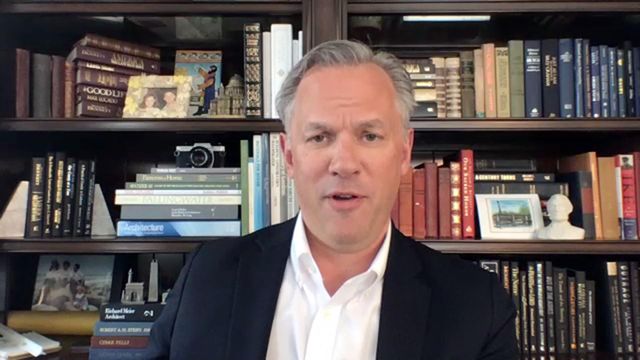Judge hears arguments in lawsuit over Cooper's shutdown powers
Lt. Gov. Dan Forest sued the governor, saying he needs more buy-in before he shuts down large swaths of the state economy.
Posted — UpdatedForest, a Republican running against the Democratic governor this year, asked the court for an injunction to keep Cooper from enforcing shutdown orders or implementing new ones without the council's approval.
North Carolina Business Court Senior Judge James Gale presided over nearly two hours of discussion on the issue Tuesday afternoon via video conference and said he'll decide the injunction "as quickly as I can."
Whatever he decides, Gale said he'll build time into his order to either allow Cooper to seek Council of State concurrence and keep orders in place or to let either side appeal his decision to a higher court. It's not clear how the judge's decision would effect businesses in the short term, but the case could have a long-term impact on the governor's powers during a statewide emergency, particularly his ability to order business closures.
Forest and other Republicans have pressed the governor to roll back an order keeping gyms and bars closed, which expires Friday. The governor hasn't announced whether he'll extend it, but he plans a press conference Wednesday afternoon on various pandemic-related issues and is likely to broach the subject.
Some of the other closure orders have already lifted, though restaurants are open only at half capacity, and other Cooper's orders require masks and other protective measures. The governor got Council of State approval for some of his orders, but he went out on his own for others.
Steven Walker, Forest's general counsel, said North Carolina has traditionally diffused executive power, including among the 10 statewide elected officials who make up the Council of State. Each has some autonomy over parts of the government that, in other states, may be under the governor.
Walker said North Carolina's governor, like local government officials, can exercise emergency powers in regions of the state on his own. But if the emergency is statewide, he needs concurrence from the Council to take some steps, including issuing long-term closure orders, Walker said.
"The lieutenant governor doesn’t dispute that COVID-19 is a pandemic or that it’s real or that it’s statewide," he said. “It’s about the rule of law."
Gale said the underlying issues in the case are of "significant public importance" and indicated he'll produce an order laying out his thoughts in detail, as opposed to a short injunction giving little explanation. Gale has also handled cases brought in recent months by bar owners and bowling alleys that targeted Cooper's shutdown orders.
Lawmakers have also tried to force these businesses back open by passing legislation, including one measure that would more explicitly require the governor to get Council of State consent. Cooper vetoed those bills, however, and Republicans in the majority in the General Assembly weren't able to muster enough support from Democrats to overturn the vetoes.
• Credits
Copyright 2024 by Capitol Broadcasting Company. All rights reserved. This material may not be published, broadcast, rewritten or redistributed.






